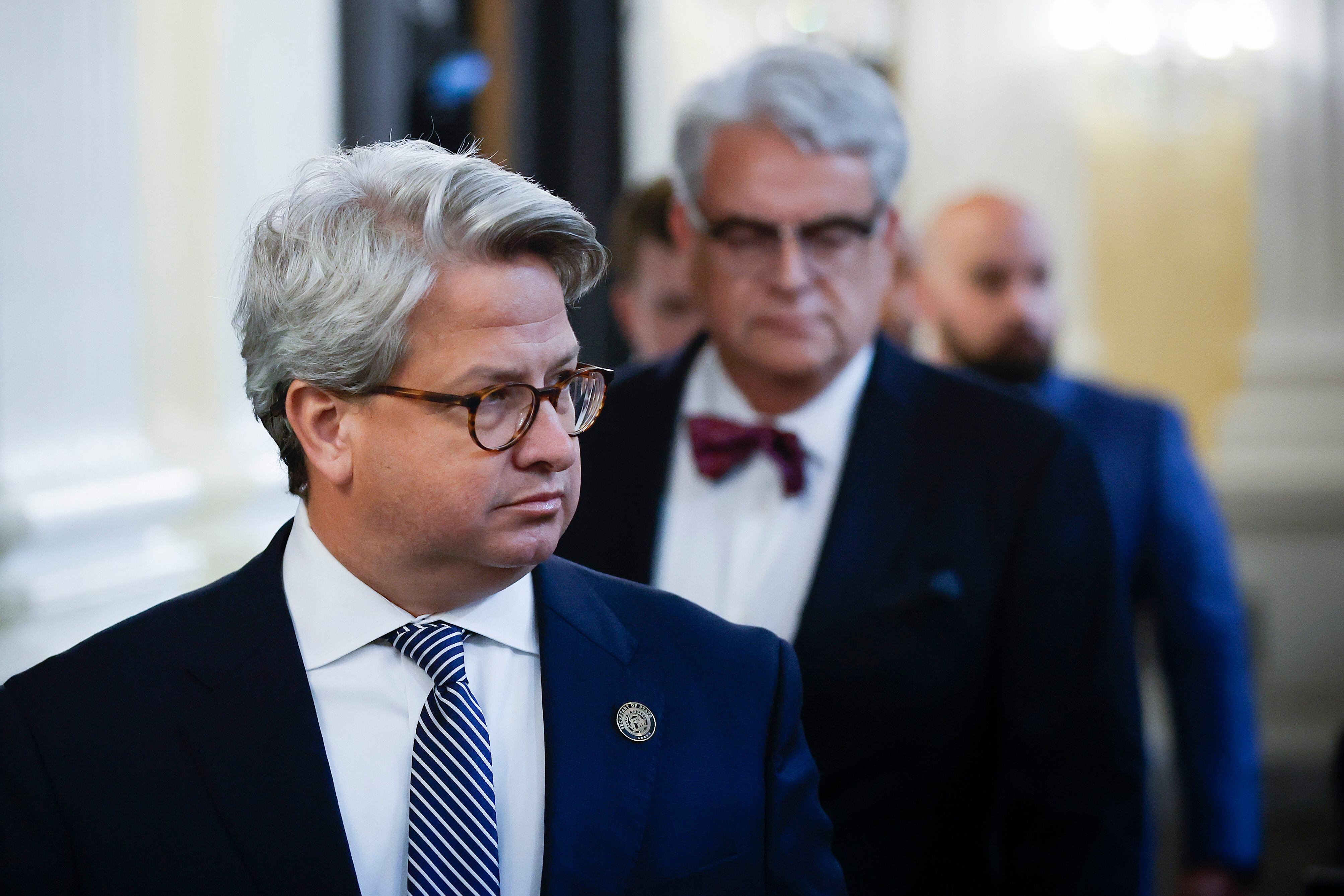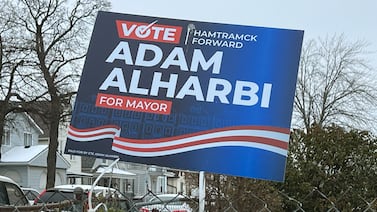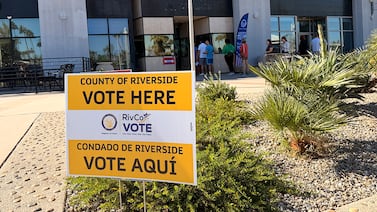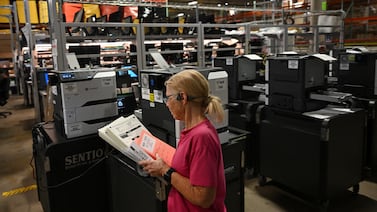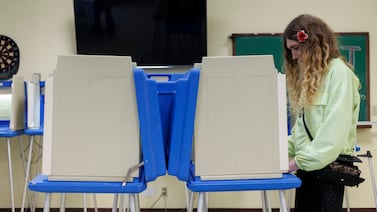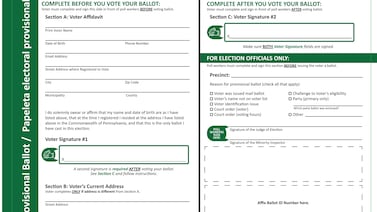A version of this post was originally distributed in Votebeat’s weekly newsletter. Sign up here.
On Jan. 5, 2020 — the day of the runoff election in Georgia and the day before the attack on the U.S. Capitol — Gabriel Sterling, the secretary of state’s chief operating officer, got verified on Twitter.
“You’re a real person now, Gabe,” joked a junior staffer, when he displayed his checkmark.
Sterling and his boss, Georgia Secretary of State Brad Raffensperger, were only just beginning to see how prominent they would become because of Trump’s effort to overturn the election. I saw signs of it that day when I was in Georgia to follow the pair of them and Deputy Secretary Jordan Fuchs about as they conducted a U.S. Senate election runoff, four separate people approached Sterling on the streets of Atlanta to shake his hand on a single day. One took a selfie with him.
Even before Jan. 6, Sterling’s celebrity was starting to take shape. In early December, he’d done a widely publicized press conference in which he declared that “somebody is going to get killed” if the rancor and misinformation over the November presidential election didn’t simmer down.
But it didn’t abate, and Sterling’s warning became obviously, painfully prescient. On June 21, Sterling and Raffensperger testified before the committee investigating the events of Jan. 6 and what led up to them, perhaps the brightest spotlight possible for election officials who were once known to few. On the way into the building to testify, one of their colleagues said traveling with them was like “traveling with Bono.”
“Obviously I didn’t expect this when I took the job,” Sterling told me. “It wasn’t part of the welcome package.”
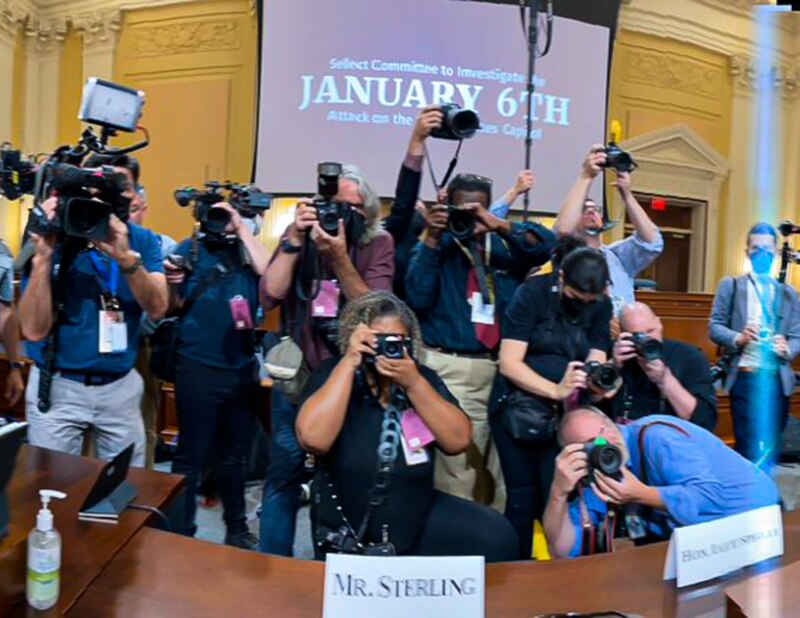
It’s a weird spot for an elections official to be in, but the events around the 2020 election mean the klieg lights have turned their way. Even secretaries of state, often a statewide elected position, had largely sleepy jobs in government bureaucracy prior to the 2020 election. While their names may have occasionally made the news, their staffers certainly did not transform, overnight, into celebrities, like Sterling has. Even he doesn’t know where things will go next.
“I neither expect nor don’t expect anything anymore,” Sterling said to me after he testified. “I am a leaf on the wind.”
Like much of what has been discussed so far in the hearings — there have, to date, been five — Sterling and Raffensperger went over what is by now familiar ground: Donald Trump pressured them to “find” more than 11,000 votes and refused to accept no for an answer, ignoring the truth and reason in order to maintain his own power.
But testifying about it gave Sterling a chance to put events in context in his own mind in a way that doesn’t happen as events are actually occurring, he said.
Sterling found the setting, the witnesses who testified alongside him, and the gravity of the questions cast a far more emotionally heavy shadow than he had anticipated. It was the first time he’d spoken directly to Shaye Moss and Ruby Freeman, two election workers he’d repeatedly been in the same room with, but whom he had no previous occasion to speak to as they worked alongside dozens of others during the election.
“I can’t imagine what they went through,” he said, contrasting his own security as a “51-year-old white guy” ‘with two Black women “who had people pounding on their door. I would never be able to understand or put myself in that place. I can’t imagine.”
Sterling had also never previously interacted with Rusty Bowers, the Republican speaker of the House in Arizona who resisted calls from Trump and his lawyer Rudy Giuliani, to cast aside the will of Arizona voters. Bowers was a transfixing witness — still visibly offended by what was asked of him on that day — and Sterling said he was even more compelling in person.
“I share the view that the Constitution is divinely inspired, and that failing to follow it is a betrayal of my oath,” Sterling said. “I was so impressed with him.”
Along with Sterling’s celebrity has come dozens of hours of depositions, testimony before a grand jury in Atlanta, countless media interviews, and his own share of harassment and intimidation by people convinced Trump won in 2020. In his testimony, he talked about these very folks: people who “believe in their hearts” the election was stolen, and will never stop being convinced it was.
What’s going to get these people back to reality? Nothing, says Sterling. He does not believe that any of these passion-motivated true believers will ever acknowledge that 2020 was fairly decided, but he does think that maybe they’ll move on. And only if everyone decides to act like adults.
“The only thing that fixes this is time and grown-ups on both sides willing to accept a loss as a loss,” he said. “The more of those we have and the more standard elections we have – that’s what’s going to get us past this.”
Back Then
We’ve heard a lot of talk about the Watergate hearings now that the Jan. 6 Committee hearings are well underway (including in this newsletter last week). But the first televised congressional hearing was in 1954: The Army-McCarthy hearings, which were broadcast “gavel to gavel” from April 22 to June 17, 1954, on ABC and the now-defunct DuMont network. It wasn’t the first place that politicians put on a show for effect, but broadcaster Reuven Frank wrote in 1997 that the medium opened new possibilities in a universe where “the theater was always open, the audience always receptive, the press always in attendance.”
New From Votebeat
- Arizona lawmakers included two pilot programs in a budget bill approved last week, allocating $1.5 million for a trial of “smart” ballot boxes in three counties and the testing of ballot paper incorporating new security features.
In Other Voting News
- Federal agents issued new subpoenas last week in connection with the investigation into the events of Jan. 6. The Washington Post reported the subpoenas were served at addresses of people associated with the attempt to use fake electors in several states to overturn President Joe Biden’s victory in the 2020 election.
- Pennsylvania lawmakers have struck a tentative bipartisan deal that would ban private money for election administration, but award more state funds to county election officials, Spotlight PA reported. The deal is still being finalized.
- Republican attorney Don Millis was selected as chair of the Wisconsin Elections Commission. Millis has said that he is open to investigating complaints made about the results of the 2020 election and considering additional requirements for returning absentee ballots.
- New Hampshire Gov. Chris Sununu signed a bill changing the handling of so-called “affidavit ballots.” Current law states that if a person doesn’t have their ID when voting, they can sign an affidavit stating that they will provide the documents within 10 days or risk being charged with fraud. The vote cast will be counted regardless. Under the new law, which would go into effect in 2023, the ballot would be discarded if the voter fails to provide required identification within seven days.
- The Kansas Court of Appeals rejected an appeal from a coalition of voting rights activists seeking to block parts of a 2021 election law. Plaintiffs said that a provision that criminalized impersonating election officials impeded their ability to register voters because it potentially exposed volunteers to risk based on a voter’s errant belief. Some said they had paused their voter registration work because of that. The appeals court said the plaintiffs lack standing to sue because they could not demonstrate harm and said the law requires the “willing impersonation” of an election official.
- In Indiana, Diego Morales, a onetime aide to former Vice President Mike Pence, won the GOP nomination for secretary of state, upsetting incumbent Holli Sullivan. Morales said he will cut early voting days from 28 to 14, and has said Indiana needs to do more to prevent noncitizens from voting.
- Top national security officials are increasingly worried about Russia potentially exploiting tensions and fostering more conspiracy theories about elections in the period leading up to the midterms. Officials stressed their concerns are so far hypothetical but said Russia could reinforce conspiracy theories about elections promoted by former President Donald Trump and his allies, and little has been done to prepare voters for the possibility.
Good News of the Week
By Christian McCann, Votebeat intern
The New Jersey State Assembly passed a bill allowing mail-in ballots to be processed (but not counted) up to five days before Election Day, hoping to reduce waits for election results. The legislation comes after it took a full day for New Jersey’s gubernatorial race to be called last November. It still must pass the state Senate and be signed by the governor. Election officials in other states, including Pennsylvania, have called for similar legislation.

